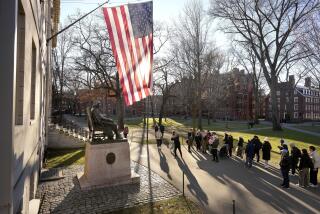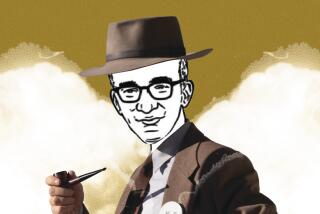Patt Morrison Asks: Rosetta man Ahmed Zewail
It’s as if he has a superhero secret identity: On the Caltech campus, Ahmed Zewail is a mild-mannered Egyptian American professor of chemistry and physics who won the Nobel Prize for cracking the secrets of molecules with femtosecond spectroscopy (a femtosecond is to a second what one second is to 32 million years). In his other identity, he is Egypt’s only Nobel laureate in science, a national hero and the inspiration for Egypt’s new technical and academic complex, the Zewail City of Science and Technology. And he is one of a council of elders guiding the transition to democracy in his native Egypt -- a novel experience in a nation with millenniums of history.
Zewail is a man of two worlds, a reach epitomized by the Rosetta Stone, a model of which he keeps in his Caltech office. The Rosetta Stone was discovered not far from his birthplace. Its inscriptions in three languages made the ancient world accessible to the modern one, and vice versa -- very much what Zewail himself has set out to do for Egypt and the West.
What did you do as the revolution began?
I have been going to Egypt for the last 30 years or so; I expected something would happen. Corruption was incredible. Education was deteriorating compared to what I got, which was excellent. The rich were getting super-rich and the poor were getting poorer.
I expected it might be the youth or only the poor people [who revolted]. It might be burning buildings. Maybe the army would step in; the Muslim Brotherhood might do something. What I did not expect was this organized and civil movement.
When it broke, I decided to support the youth because I knew they were waiting for people like me to say something. I gave [a broadcast carried] to millions and millions: “The time has come [for] President Mubarak to step down.”
I was called upon to form something called the “group of the wise,” along the lines of what this country has done during difficult times. I talked with ministers. I talked with heads of Islamic institutions. I met with leaders of the groups of the revolution.
They were determined to change their future. After 18 days of revolution, [Mubarak] decided to step down, and the rest is history.
How did you feel?
I had tears in my eyes. Egypt was the first democracy in the Middle East. Women were unveiled in the 1920s. Egypt is a country of civilization, of culture. It shouldn’t be suffering.
Margaret Warner, of PBS, said sitting in public in Cairo with you was like being with a combination of Einstein and Bono. You’re asked often about your future role in Egypt, perhaps even the presidency.
There was a movement to have me run as a president. [But] I came to the conclusion that the best way I can help is the way of the scientist. What Egypt needs now is somebody outside the political scene, the divisions and the parties. I’d rather have the influence than the power, and the influence to me is to build institutions of independence and democracy, to regain for Egypt prestige in education and science and technology. You cannot do this as one person, but by working with the political structure, somebody like me can play a more significant role than just being in the political system.
The Zewail City of Science and Technology got its start right after you won the Nobel Prize in 1999.
After I went to Stockholm, I had a meeting with [Mubarak]. I said Egypt needs much more in science and education, and from what I saw, he gave his order to implement it.
After that, basically for 12 years, I think I succeeded and failed. I think I succeeded in getting the Egyptian people excited about the importance of science, and this is the only way Egypt can get out of this dark ages. On the other hand, the failure was because the more [the government] saw me popular with the masses, they were jealous because they were worried that I might be replacing them. So they played all kinds of tricks. They put [the project] into the Egyptian bureaucratic machinery. They kept delaying it.
Now the cabinet of ministers voted unanimously in May to establish the Zewail City of Science and Technology. What gives me the real thrill is that we can finally get into molding the country in the right direction. The [nation’s] political issues are very complex. The economic issues are very complex. There’s no way they are going to be solved in a month or two. So my goal is to have a national project, something like building the [Aswan] dam of the 1960s.
Everybody seems to be excited about this. They’re putting money in. Not [just] rich Egyptians, [but] ten pounds from a farmer. We want everybody to contribute -- the United States, Europeans, everybody. It’s a well-defined project [to] help the whole population of Egypt. If everything goes OK, we would begin admissions in 2012.
It sounds as if your goal is that Egyptian students wouldn’t have to come to the West for higher education, as you did.
They can come and visit Caltech and MIT, but they should go back and enjoy their own country and contribute to their own country.
If I may say, I’d like to be the [Robert] Millikan [founding president of Caltech] of this project. The only title I have is chairman of the board of trustees; I would like to give a vision, and put that vision and the institution on the right track.
In your Nobel speech you said Egypt would have dominated the prizes if they’d been around several thousand years ago. What happened to the Arab world that generated algebra and astronomy?
This is a profound question that would need two pages in the L.A. Times! The city I came from, Alexandria, had the first library, the first Caltech, of the whole world. Archimedes was there, all the big names. But what went wrong is [the] typical rise and fall of civilizations -- the Roman Empire, the Greeks, the British.
That’s long term. In the last 200 years, Egypt had a renaissance. [The 19th century ruler Muhammad Ali] made an investment in education, science. Egypt led the culture of the whole area, until the revolution in 1952. [President Gamal Abdel] Nasser had good intentions, but he really didn’t believe in democracy. What followed, for the last 60 years, is that Egypt lost its democratic institutions.
Do religious extremists pose obstacles to Egypt’s scientific and technological revival?
I know this is a very important question for the West. Let me put it this way: There is nothing in Islam that is fundamentally against the quest for knowledge. [Otherwise] it could not have produced all of the giants, in the glorious days when Europe was in the Dark Ages.
I have not seen any resistance even from the fanatics when it comes to reaching out to knowledge. There are of course politics in religions and religion in politics; it does exist in Egypt and it does exist in the United States, right?
So if democracy succeeds, everything else is possible?
That’s right. We had a president who stayed for 30 years in office. There are debates, the final constitution has not been written, but the [recent] referendum limited the term of the president. And that is a huge transition for Egypt, since the days of the pharaohs.
What are Americans’ misconceptions of Egypt and vice versa?
I think Americans in general have a favorable perception of Egypt as a civilization. I think the media sometimes does color the situation as far as Arabs and Muslims, [that] they are violent and we should be careful about Islam. We always have to have an enemy somewhere, and that’s not good for this country. It doesn’t mean there aren’t fanatic Muslims, but there are also fanatic Christians and fanatic Jews. It exists in every faith.
I believe Egyptians have favorable views of the Americans. What Egyptians don’t like sometimes is American policy.
You have said science without religion would be blind, and religion without science would be lame. Yet many scientists are agnostics and atheists. Aren’t you a rarity?
Not rare, I think. There were statistics at one point -- close to 50% [of scientists] were believers. Millions of people around the globe have faith and believe in something. I don’t think it’s my role as a scientist to tell these people they are stupid. If religion and faith make them better human beings, what a fantastic force to utilize! So I don’t think we need to be dogmatic -- that only science can answer all of the questions of this universe.
You wrote in the Los Angeles Times about science as this country’s soft power, and yet you worry that science isn’t much on the public’s or news media’s radar.
I’m in awe of the fact that the American economy and leadership in the world is based on science and technology. [Yet] we don’t give science here the coverage, in a country that is prosperous because of science and technology. There’s another problem: Americans not going into science as they used to. It’s disturbing. I am convinced that the future of this country, to remain a superpower, is investment in education and science. And if the United States weakens that investment, I’m afraid this will be the beginning of the end.
Americans always ask this about pure science and research: What’s it good for?
The answer is twofold. If you don’t produce new knowledge, then you are living in the dark ages. Just the sheer knowledge that [can] change the way we think about something is by itself beautiful and important. Second, nobody, including Nobel Prize winners, can say, “I will predict what this research [result] will be.” Look at for example the MRI that every hospital uses. That all began as basic research to understand how electrons spin around; nobody [would] have anticipated that huge impact on human health. Transistors are the same; lasers are the same. It is simplistic to think we do research because we know what it is good for.
You study femtochemistry -- extremely fast chemical reactions. What are you working on now?
This is the most exciting period of work in my life. [The Nobel work involved] atoms and molecules forming new bonds and breaking old bonds, and freezing [images of] these molecules so we can get a look at them. We can look for all [kinds of] nano materials now. We made what we call a nano piano. A billionth of a meter -- it has all the keys and you can see how the keys play. Now we [can] move into the biological systems, to see why proteins do what they do, why cells do what they do.
Can I “see” the nano piano?
We can go to this [he demonstrates on his computer] -- it’s a nano harp. Now the strings are moving. [It makes harp sounds.] This is the piano; you notice the keys are different thicknesses. We can control it. [It starts to play Bach.]
If you put that online playing the Egyptian national anthem, you’d get a jillion hits.
That’s a great idea!
This interview was edited and excerpted from a longer taped transcript. Interview archive: latimes.com/pattasks.
More to Read
A cure for the common opinion
Get thought-provoking perspectives with our weekly newsletter.
You may occasionally receive promotional content from the Los Angeles Times.







